The 5th Hong Kong International Film Festival, part nine
More of my notes from the 1981 Hong Kong International Film Festival… and as always I haven’t edited these reviews in any way, although in some cases I no longer agree with what I wrote back then.
9. ENGLISH-LANGUAGE
From the U.S., Australia, and Britain:
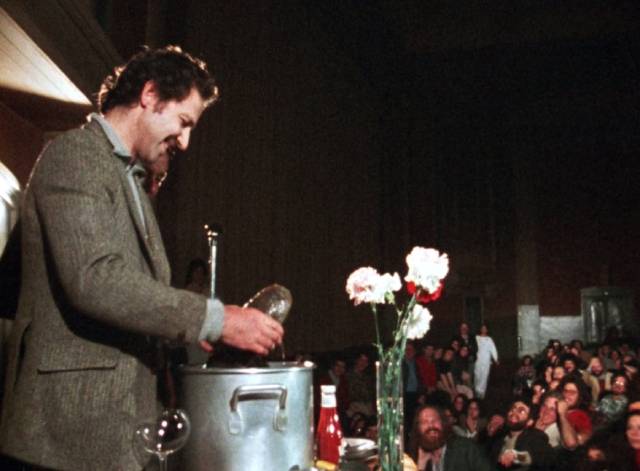
Les Blank’s two documentaries – WERNER HERZOG EATS HIS SHOE and GARLIC IS AS GOOD AS TEN MOTHERS – are amusing looks at off-beat subjects, done with humour but not ridicule. The first is exactly what it says: a 20-minute film of Herzog cooking and eating a hiking boot, intercut with him explaining why – he dared an eager film enthusiast, Errol Morris, to make his own film, saying he’d eat his shoe if Morris ever got down and did it. Morris did [with Gates of Heaven], so Herzog did. It’s amusing, yes, but it also reveals an obsessive quality in Herzog which is only partially alleviated by humour. Perhaps it’s this very obsessiveness, that fixing so intensely on a point, which makes his good films (AGUIRRE, KASPER HAUSER) so very good, and his less successful films (STROZEK, NOSFERATU), where the aim isn’t dead on target, seem so much less than the lesser films of a great director ought to be.
GARLIC is a 50-minute look at the herb – its history, its reputation (good and bad), its mythology, and the cult that surrounds it, swearing by its almost magical qualities. It too is about eating and obsession – but it’s in a lighter vein.
Jackie Raynal is a Frenchwoman transplanted to the U.S. Her NEW YORK STORY is the proposed opening segment of an anthology film (it runs half an hour). On the whole, it’s a mildly amusing short story preceded by a strange prologue describing a hotel which is apparently a living organism which feeds off its guests. The story proper is a kind of off-centre sitcom: a bland, good-natured liberal intellectual couple faced with the wife’s ennui (no simple boredom here). So the husband goes out to hunt up a lover for her. The pacing seems off, the performances flat, little sense of rhythm in the dialogue – but perhaps the dullness is intentional, a contrast with the unconventional behaviour of the characters, a parody of the flatness of daytime soap operas. But apart from a few amusing moments, I found it not very interesting. The inclusion of a brief clip from a Buster Keaton movie served only to show Raynal’s inadequate control – Keaton had imagination and perfect timing.
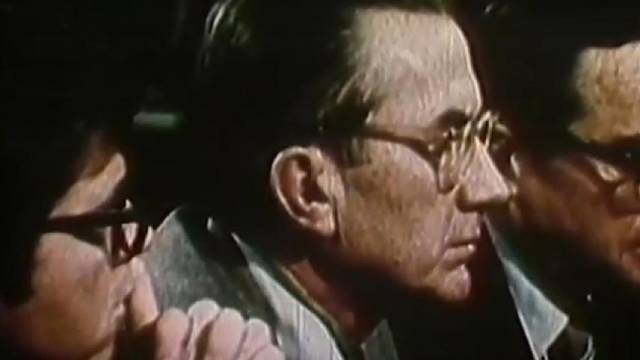
Allan Francovich’s three-hour documentary ON COMPANY BUSINESS – about U.S. postwar foreign policy and the part played in it by intelligence agencies – is profoundly disturbing. Not so much because of its revelations of political and moral wrongdoings as in the realization that none of these revelations surprises. One’s response is simply an “of course” acceptance of it all. Decades of deliberate falsification and outright lying have made it impossible to trust what you hear about any event – nothing is what it seems – so you give up believing (give up caring?). The U.S. in its relentlessly blind desire to see only black and white keeps making stupid decisions, violating all the principles of democracy they hypocritically expound, a nation running on a motor of ignorant self-interest – repeatedly, their actions force people into the very revolutions the U.S. is supposedly trying to prevent. Again and again, serving limited capitalist interests, they violate peoples’ wills, bringing about oppression and torture – all in the name of “freedom” – driving reasonable people (vide Castro) towards the “enemy”. The film is a depressing litany of stupid, reprehensible actions (among other things it details the Mitrione case, basis of Costa-Gavras’ STATE OF SIEGE; the real story is more vile and horrifying than anything in that tense thriller). I might have been more impressed, though, if I hadn’t at the time of viewing just finished reading Anthony Summers’ Conspiracy, on the Kennedy assassination. ON COMPANY BUSINESS starts with a look at the Bay of Pigs and in the light of Summers’ work, Francovich’s treatment looks crude, incomplete, and deficient in important areas. For instance, the film asserts that the CIA never works on its own initiative but always at the directive of the higher levels of government. If Summers is right, however, that control is very tenuous – and, in fact, the intelligence agencies, or people within them, apart from operating on their own in a lot of cases, deliberately feed those higher levels with false information in order to create the directives they desire (just look at the recently exposed “white paper” on El Salvador, trumped up and loaded with unfounded “information” – yet used as the basis of U.S. military involvement – once again in favour of a dictator, against a popular movement). One of the film’s sources for this assertion is David Phillips, strongly indicated by Summers’ evidence to have had a prime part in the conspiracy leading to Kennedy’s assassination!
As the film goes on, as interviewee after interviewee is exposed in his lies, it becomes harder and harder to summon up even cynical laughter. In the end, you feel tired and sour and just want to get some fresh air.

Paul Bamborough’s THE TOM MACHINE is an effective low-budget SF short feature (50-minutes; doubled with Raynal’s NEW YORK STORY). It begins very funny, with Tom trapped in a THX-like claustrophobic world – a dull, routine existence, with a dull, meaningless job (punching numbers into a computer console for no apparent purpose) in a dull, meaningless bureaucracy. Fed up, he decides to get out – find some country somewhere, become a sheep farmer. And things get darker. His co-workers, his boss, his girlfriend all insist it’s impossible – there’s nowhere to go; this is all the world there is. Odd things happen: he loses his way in a familiar corridor; he sees strange things which are passed off calmly by others (in the middle of a conversation some coppery, metallic thing suddenly appears floating in front of him; he asks “what’s that?”; “a canary” his friend replies and carries on talking). It turns out that his “life” is a construct put together in a TV studio and pumped out to him as he lies drugged at the controls of a spaceship (his meaningless job is actually an endless series of course adjustments). The film has a number of strengths which overcome its low-budget look (visually, it’s like a TV drama): the skilful way in which the truth is uncovered as fragments break into the false life; a good sense of comedy – there’s a fine, pushy, sarcastic household robot with the voice of John Cleese. And Bamborough keeps it moving so smoothly that it’s only afterwards that you begin to question some of the story’s logic: for instance, why is the pilot supplied with such a sterile fantasy life? to prevent overexcitement? in which case, what about some of the bizarre, potentially harmful input (at one point he watches a TV game show which involves guessing the number of victims in this or that disaster)? Still, the story is strong enough to survive a few illogicalities. And Bamborough manages to end it well with a single image containing a few ambiguities: the truth revealed, Tom finds himself running free on a green hillside with his flock of sheep – is he lost or saved by severing himself from the fed-in fantasy and escaping into a fantasy of his own? He’s free from that mind-numbing sterility; but at the same time he’s no longer at the controls of his ship – and so maybe dead.
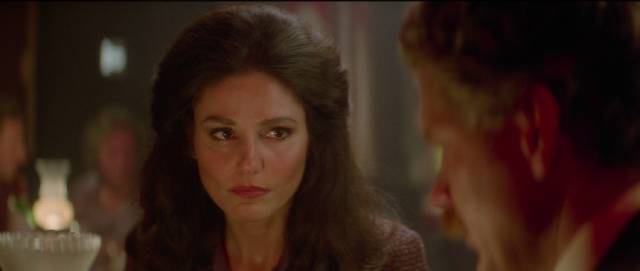
THE BLACK MARBLE is the second collaboration between writer/producer Joseph Wambaugh and director Harold Becker. And while it’s less ambitious than THE ONION FIELD, it’s a more successful film, more of a piece. It’s also one of the best, most distinctive, most individual American films of the past few years – and, oddly, has received hardly any commercial release. Because, like Rush’s THE STUNT MAN, it’s hard for an adman to label? It’s a sad, comic love story about lonely people living on the edge – of society, of sanity – desperate, afraid…. Wambaugh’s talent for character and dialogue, for creating convincing offbeat situations, shines in this film – somehow you feel it shouldn’t work, it’s such an odd mixture; but everything is held in balance. It’s funny, but with disturbing undertones – and when they surface, it becomes dark and moody. The care devoted to all the characters makes it moving. And the “happy ending” is sweet and precarious, two lonely people holding on, taking a chance against the risks of an uncertain relationship.
The plot involves the kidnapping of a prize dog by a man with gambling debts. Two cops are put on the case – an alcoholic Russian (Robert Foxworth), a misplaced romantic crushed by the viciousness which surrounds his work; and a tough woman (Paula Prentiss) who keeps herself shut away in a hard shell of keeping-things-tidy-and-uncomplicated. Their abrasiveness slowly turns to a reluctant caring and finally an awareness of their need for each other. Against them is Harry Dean Stanton, kennel-owner and dog-lover driven to kidnapping to pay off a gambling debt. It’s through the dogs that he manages to hold on, through them that he seeks a way out – only to find himself becoming something opposite to what he thinks himself to be. There’s a desperately funny and terrifying scene in which, confused and afraid, his playing of the kidnapper role drives him into an act totally against his nature (he cuts off the dog’s ear) – it’s a scene with so many emotional and psychological levels that you’re rather surprised to see it in an American film (they’re traditionally played closer to the surface action). It’s this combining of comedy with horror, weaving one about the other, which makes the film continuously fresh and unexpected, which gives it its rich texture. And makes it possible for genuine moments of horror to get past your usual defences and truly affect you: when Foxworth tells Prentiss what finally turned him into a drunk (a story of child killings) it sums up the characters, their world, and even the general callousness we’ve all developed in our atmosphere of escalating senseless violence. The film, as entertaining as it is, somehow manages to define the shell-shocked mentality of modern North American urban life.
The evidence of the film festival would seem to indicate that there is a definite and distinctively British cinema – though it’s on something of a small scale (except for such internationally scaled productions as Nicolas Roeg’s BAD TIMING, which is yet English – not like those amorphous made-in-England things [akin to “Canadian films”] like RAISE THE TITANIC).
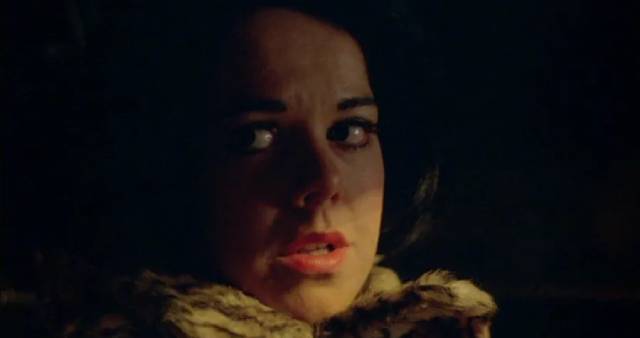
Richard Woolley’s BROTHERS AND SISTERS is a solid, sincere, intelligent film about sexual attitudes, which is consistently interesting even if it fails to create a dramatic excitement which would give it an audience wider than those already concerned with its central questions. Woolley is a clear-headed director who knows how to embody ideas in character and event, never coming to a standstill to preach. The film uses a fractured time scheme (events before, leading up to, and following the murder of a part-time prostitute broken down and intercut), but it never becomes confusing because of the director’s control. He exploits the thriller form to induce expectations in the audience based on their experience of film and their own sexual attitudes – expectations which he deliberately frustrates (he never supplies the juicy sordid scenes we all long for) – and so uses the very structure of the film to reinforce his examination of ideas. Basically, BROTHERS AND SISTERS parallels the exposition of the sexual attitudes of two brothers whose activities on the night of the murder may or may not connect them with the murdered prostitute. James, an army officer, is a traditional male chauvinist, an upholder of all the old values based on woman-as-property (whether she’s wife, servant, prostitute, or simply a woman in the street). His position isn’t ideological – it’s simply received, its tenets never questioned. His brother David is more complex – and as the centre of the film, could have brought the whole works crashing down.
He is fraught with guilt based on those received ideas; he’s obsessed with eliminating them, constantly working out a new sexual politics for himself – which he feels compelled to try and force on others. His fear of those old attitudes in himself makes him touchy and humourless – and highly suspect; the sheer weight of his denial implies the great strength of the attitudes he’s working to suppress – the attitudes which reduce woman to object and thus make sexual murder possible. The character could have been a bore, but the analysis is so acute that, as unlikable as he is (on an emotional level his unpleasantly chauvinistic brother is rather more appealing), he remains fascinating. He is concerned not with a genuine understanding of the true condition of women, but with his own liberal-minded rightness. He is armed not with an understanding, but with a whole battery of sociological theories. In fact, he thinks he knows women better than they know themselves. Yet this sense of guilt, too extreme though it is, is, the film implies, an indication that he’s moving in the right direction. He really doesn’t help things much, but at least he’s aware of the need for atonement. And in the end, it is hinted that it was probably James who committed the murder. BROTHERS AND SISTERS is about the numerous forms exploitation of women takes – James’ psychological reduction of them to objects, the economic reduction of them to objects (the abused housewife forced into prostitution to make ends meet), even David’s use of them as a club to batter his own sense of guilt is a form of exploitation. The film doesn’t offer a solution to the problem – but then its intent is to expose and explore attitudes as they now exist. Awareness is a first step towards resolution.
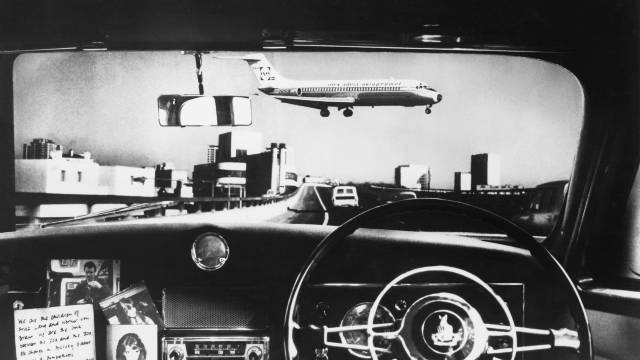
Chris Petit’s RADIO ON presents a problem. I’ll have to see it again before I can really evaluate it, I think. Because there is rather a large difference between what it seemed to be at the time of viewing and what it has come to seem in retrospect – a difference based on a realization of Petit’s intent which came some time after I saw the film. My initial reaction was one of disappointment, even a certain frustration. I could see the considerable technical accomplishment – the skill of the camerawork, the editing, the use of sound; I could appreciate the power of individual scenes, the quality of the acting. But in the end I was left annoyed. It seemed nothing more than a bleak exercise in the Wenders-esque journey-to-nowhere (Wenders is listed as associate producer) – but it was so much frostier than Wenders’ films, lacking his sense of the characters learning something about themselves. This was “non-event cinema” at its most extreme. Not only was it about boredom, restless movement, pointless encounters, non-relationships – its very form was an embodiment of these things. The beautiful black-and-white photography and the good performances couldn’t overcome the fact that such a relentless focus on aimlessness results in a feeling of aimlessness. The film ultimately seemed to have no point beyond its pointlessness. What exactly was this talk about an examination of the place of the hero in cinema in the late ’70s and ’80s? A man lies dead in a bathtub at the beginning. His brother travels from London to the West-country to find out what happened. We hear a lot of bleak rock music on the soundtrack. He meets people – a deserting soldier (a Scot who tried to escape unemployment by enlisting, was sent to Ireland twice, is now running – and bordering on the psychotic), a punk girl at a hotdog stand, a German woman searching for her lost daughter, her husband’s aunt who complains about today’s young, another punk girl in a pool hall. These encounters are all well handled, but they don’t amount to anything. They’re like the garage mechanic (played by Sting), locked in his airtight, static existence, focused on the dead Eddie Cochran. Although the “hero” meets the woman his brother lived with, and there are vague hints about the death being connected to a just-exposed pornography ring, there is no plot movement, no resolution – the film drifts out of nowhere back to nowhere.
So why should I have changed my opinion? Because there is a piece of paper glimpsed in the film’s opening shot with something written on it, something I didn’t take any notice of at first. I only actually read it some time later – it’s repeated on the film’s poster. And it’s the key; reading it, the significance of the title clicked and it became apparent that the film is about something. Knowing this, I’d like to see it again to find out if it changes my perception of what’s up there on the screen. “We are the children of Fritz Lang and Werner von Braun. We are the link between the ’20s and the ’80s. All change in society passes through a sympathetic collaboration with tape recorders, synthesizers and telephones. Our reality is an electronic reality.” Essentially we’ve externalized the ability to experience; we’ve created an external, electronic brain, all-encompassing, which digests and interprets experience and feeds us the result, labelling it “reality”. At the same time making ourselves passive, unable to interpret. The hero is a “radio”; switched on, he doesn’t act (he can’t), he just receives – he’s a device through which information flows, it doesn’t matter what the information is – the device can’t read it, simply channels it. And so he remains untouched by it. With the creation of this external electronic “mind” with which we’ve enveloped our world, we have thrown away the ability to think and act on our own thoughts – and this numbing gray boredom is the frightening result.
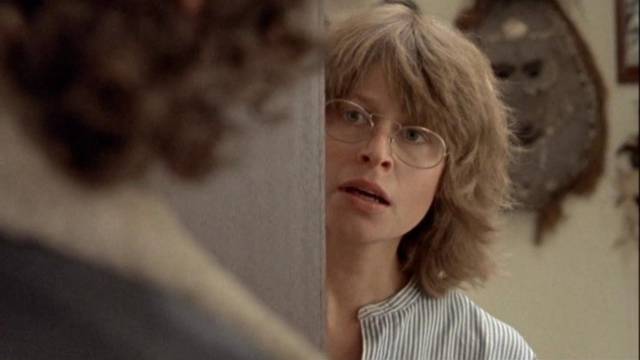
Before I get to BAD TIMING (the major English language film of the festival), I have to say something about my personal favourite from this group – Peter Weir’s 1979 film, THE PLUMBER, made for Australian TV. It’s an excellent, uncomfortably tense “horror” story – one of the best I’ve ever seen – which is not only terrifying, it’s also very funny. It’s set in a circumscribed world – almost entirely shot in a single flat in a large, characterless university staff residence block – into which is admitted an unknown outsider, a plumber who turns up one morning and says he’s there for a routine check of the pipes. He finds them in a “mess”, he says, and sets to work, making holes in the bathroom walls, jury-rigging new pipes which clutter the room more and more ludicrously. The young wife working on her degree thesis finds her days disrupted by the noise and the ever-more obtrusive presence of the plumber. He’s aggressively “friendly” as he intrudes more and more into her privacy; there’s nothing specific, nothing overt, but his very presence is threatening because it doesn’t belong in the young couple’s airtight world. Is he dangerous? or is it all just due to her inactivity-stifled imagination? Everyone else, including her husband, likes Max the plumber – he’s so friendly and helpful. They all think she’s cracking up, become annoyed with her. And in the end, she’s the dangerous one: she frames Max for the theft of a valuable watch.
Beyond the taut personal story, there is a neat and imaginative parable of class struggle. Max is waging war on the privileged, on the intellectuals (there are reports of a number of flats with similar “plumbing problems”); he himself is an uneducated ex-con, a self-styled singer of protest songs. And the weapons he uses are the weaknesses of his victims. He attacks society by bringing out its self-generated fears of the lower classes. He encourages their fear and distrust of the coarse and uneducated, and plays on their very special weakness: specialization. Among them, knowledge has become so circumscribed that they have to take on faith what they’re told by the specialist in another field (like plumbing) – even when common sense should tell them they’re being had, how can they be sure the specialist is lying? After all, he does have special knowledge which they don’t possess. This focusing of knowledge produces a wide-ranging insecurity. Even within a specific discipline, people can become so specialized that they won’t believe something told them by a fellow specialist which doesn’t fit in with their own ideas – as with the U.N. doctors here who reject the young husband’s radical work on vitamin deficiency.
Weir uses this psychic claustrophobia, combined with a physical claustrophobia (the small-scale due to TV origins, action restricted to the flat), to generate the uncertainty and ambiguity which is the root of nameless urban fears. But spurred by her fear, the wife finds her own resourcefulness in this underground battle; she retaliates by exploiting Max’s weakness – the very distrust of the coarse and uneducated that he uses against his enemies. In the end, the rules and opinions of society, formed by those enemies, are on her side and he’s dragged off helpless. THE PLUMBER doesn’t have the scope, visual or narrative, of THE LAST WAVE, the cosmic themes, but it’s so well designed, so successful on its own small scale, that it is quite obviously the work of a skilled, intelligent, major director. And it was made for TV!
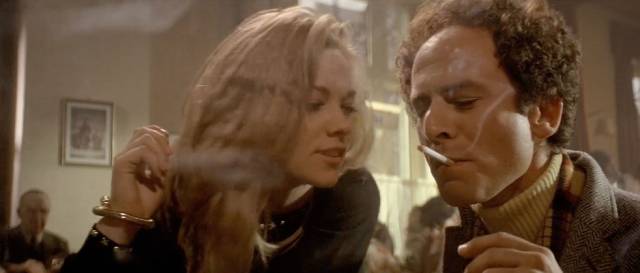
Two things strike you immediately about Nicolas Roeg’s BAD TIMING: its complete yet unsalacious focus on sex (it’s a “sex story”, not a “love story”) – and its completely open moral concerns. It might be a hopelessly pessimistic film, but it isn’t fashionably non-judgmental. This gives it an odd, highly distinctive quality – so modern in subject and technique, so old-fashioned in sensibility. BAD TIMING is a visually stunning portrait of an obsessive relationship which begins and ends in sex. Alex (Art Garfunkel) is a psychologist teaching in Vienna; Milena (Theresa Russell) is an American separated from her Czech husband. They meet at a party. Their sexual relationship is intense, heightened by their character differences. Milena lives for the moment, enjoying now without worrying about consequences; Alex has to have everything pinned down, arranged in order, explained and “understood”. But gradually the differences begin to frustrate. Their emotions are totally out of sync (Milena loves Alex; he wants to possess – and thus stifle – her); the relationship can’t move, it’s locked into sex-and-only-sex. The passion becomes destructive. Alex goes about systematically breaking down Milena’s personality (he’s so rigid himself, she can’t get him to bend) – and in the end can only confess “love” when her self has been eliminated and he can have her without conflict – essentially an act of necrophilia (she has taken an overdose and is in a coma). Roeg’s elaborate cross-cutting through time sets up more echoes than it did even in DON’T LOOK NOW; echoes of the past and the future in the present. It reveals the gradual deterioration of the relationship, its corruption through time, by following the course of a particular thread without surrounding it with distractions. But it also locks the whole thing into a static timeless now, a trap with no way out. The film is like a pressure cooker waiting to explode. But the technique goes beyond this – and beyond the creation of some very startling, disturbing shock effects (like thrusting you without warning into the gruesome tracheotomy scene) – to produce some really subtle effects, particularly those involving one of the film’s central themes: spying. Alex, professionally and personally, spies on the mind (spying, voyeurism, is the subject of the only lecture we see him give – throwing an interesting, unintentional [on the character’s part] light on his own behaviour; at one point he also takes a job with American intelligence to provide psychological profiles on some people, a job which produces repercussions in the plot); he shields his own voyeuristic nature behind the facade of an analytical intellect. (Voyeurism, it should be noted, requires the objectification, depersonalization, of its target – an important point in light of Alex’s behaviour within the relationship.)
The policeman (Harvey Keitel) investigating Milena’s attempted suicide (and Alex’s connection with it) is also a professional spy – it’s in the nature of his job. But it is in him that the film takes its most unexpected direction – and achieves its unexpected depth. For he spies with an eye to greater moral understanding; where Alex hides his voyeurism behind a clinically “detached” shield, the detective is open about it, and actually goes beyond the personal interest to an impersonal moral concern with the roots of human behaviour – what Alex professes but doesn’t achieve. Alex attempts to pin down and label, to find a kind of file clerk’s “understanding” of the psyche; the detective is striving to break through such futile labelling (which has the adverse effect of blocking a genuine understanding) to find and expose the deeper moral significances underlying action. The detective, unlike Alex, believes in will and so, unlike Alex, he believes in responsibility. Of course, since language is the labelling faculty, the detective’s concerns are deliberately made semi-articulate in the film – which makes it possible for Alex to brush them aside with his words, clouding rather than revealing “truth”.
Now, Roeg’s cross-cutting technique, breaking down temporal barriers, produces a disturbing sense of the detective being present and watching the whole of the relationship. It becomes apparent that, thematically, Alex and the detective are two parts of a single personality which has been split down the middle. The detective is the part of Alex which he has suppressed with his emphasis (self-serving because it makes responsibility a non-issue) on detached observation. He has cut off his moral self, his conscience. But that self still exists – stifled, yet attempting to express something not definable in clinical terms, striving to make Alex admit his own responsibility for almost destroying Milena. But Roeg pessimistically sees it as a lost cause: rationalism has been built into such a powerful neurotic defence that it could only be punctured if luck was on the detective’s side – and in the film it isn’t. Alex gets off without ever having to face what he has done.
It’s a bleak film despite its dazzling surface – but remarkably watchable; the performances are excellent (Garfunkel is frighteningly “normal” in his destructiveness, Russell is explosively sensual), the attention to detail so thorough that it seems to be one of the most “real” films I’ve seen – it’s amazing that Roeg can draw such depths from what is essentially a very simple story, and yet not crush that story with the weight of those depths. As an indication of his skill, he manages to sum up the central relationship with a single image, seen at the film’s start, its close, and once in between: the Czech-Austrian border, a river spanned by a bridge – the border, like their sex, both joins and separates, keeps the relationship of the two sides in stasis, remains constant while they flounder on either side.…
Comments